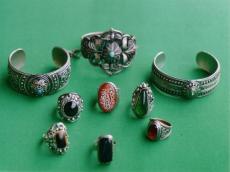|
|
TODAY.AZ / Arts & Entertainment
Miracles of metal art
09 August 2017 [17:44] - TODAY.AZ

By Azernews
By Amina Nazarli
The earliest artifacts and jewelry were made from wood, ivory, bone, stone and earth. Later humans learned to extract metals from the earth, to shape them into objects and/or fire them in kilns. Over time, metalworkers developed a variety of techniques to create different effects and various objects.
A number of findings revealed during the excavations across Azerbaijan show that in the 2nd millennium BC, our ancestors used samples of dishes, daggers, axes, belts, gold ornaments made of bronze in their everyday life.
The metal products found in Nakhchivan, Mingachevir, Gedabek, Gazakh, and Ganja region of have about 5,000 years of history.
Over time, the metal craft had been improved in Azerbaijan reaching the highest level in the Middle Ages. The folk craftsmen created different types of weapons from metal, household items such as utensils, chests, dishes, amazing jewelry and other examples of skillful handicraft, many of which have survived to this day.
Among works of art made of metal one may found the patters with designs and descriptions on them, according which one can learn about traditions, beliefs and clothes of that time population.
Today, many antique samples of the traditional metal works are kept in museums of Azerbaijan and abroad.
The metal art, which has deep roots in Azerbaijan, still lives thanks to the efforts of craftsmen, who pass their secrets from generation to generation.
PhD. Shaig Mammadov, who lives in the second largest city of Azerbaijan -Ganja, is one of the masters who creates his works and wants to give a new breath to the forgotten artistic traditions of this art.
Shaig, who is also working as a teacher at the Ganja State Pedagogical University, creates different shapes of daggers, bracelets, medallions and rings, pencils, lashes, book covers and so on. These samples, made of silver, steel, brass and other materials, deserve to decorate not only our life, but also the most prestigious museums of the world.
The famous Ganja Gate manufactured by renowned local blacksmith Osmanoghlu Ibrahim in 1063 and taken away by invaders in the aftermath of the earthquake in 1139, was thoroughly restored to its original view in 2008 by this talented man.
Adorned by the national ornaments, the Gate was re-installed at the city’s entrance with the assistance of the Heydar Aliyev Foundation, Azertac reported.













URL: http://www.today.az/news/entertainment/163953.html
 Print version
Print version
Connect with us. Get latest news and updates.
See Also
- 15 November 2024 [17:54]
Azerbaijan's historical and cultural heritage on spotlight at COP29 - 15 November 2024 [15:11]
National judo team to compete at European Judo Championships U23 Individuals - 15 November 2024 [14:39]
Azerbaijani designer awarded Ahmad Javad medal in Turkiye - 15 November 2024 [13:33]
Baku to host Azerbaijan Dance Cup - 15 November 2024 [12:59]
Schedule of Azerbaijani national team's matches announced - 15 November 2024 [12:46]
"Voice of Nature" exhibition to open in Ganja - 15 November 2024 [11:22]
Heydar Aliyev Center hosts MAMA "Mother Nature" int'l art project and exhibition "Participate!" - 14 November 2024 [18:07]
Azerbaijan's architectural and landscape photographs showcased in Russia - 14 November 2024 [17:33]
Heydar Aliyev Center holds concert program "Awakening" - 14 November 2024 [17:16]
Winners of int'l photo contest "Children's Eyes on Earth" announced
Most Popular
 Azerbaijan's Leadership at COP29: Addressing Global Climate Challenges and Exposing Hypocrisy
Azerbaijan's Leadership at COP29: Addressing Global Climate Challenges and Exposing Hypocrisy
 Provocateur Le Pen go to jail
Provocateur Le Pen go to jail
 Macron Stung by President Ilham Aliyev's Truth: French Minister Ordered to Skip Baku Visit
Macron Stung by President Ilham Aliyev's Truth: French Minister Ordered to Skip Baku Visit
 Who uses Greta Thunberg and how?
Who uses Greta Thunberg and how?
 Climate Platform for business, investment & philanthropy launched within COP29
Climate Platform for business, investment & philanthropy launched within COP29
 United States announced plans to deepen security cooperation with Indonesia
United States announced plans to deepen security cooperation with Indonesia
 Azerbaijan’s COP29 presidency sets precedent with focus on amplifying voices of vulnerable nations
Azerbaijan’s COP29 presidency sets precedent with focus on amplifying voices of vulnerable nations
